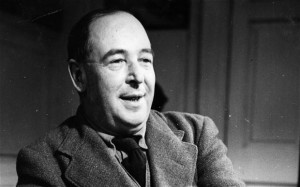Topics:
Search for topics or resources
Enter your search below and hit enter or click the search icon.

A few weeks ago I read Zadie Smith’s essay, “Joy,” in the New York Review of Books. If you haven’t read it already, I highly recommend doing so. It’s a beautifully written, decidedly contemporary reflection on joy with a tone I suspect Millennial and Gen-X readers will particularly resonate with. I also recommend Gary Gutting’s follow-up piece in the Times, helpfully bringing Thomas Aquinas into conversation with Smith’s portrait of joy.

As I’ve reflected on Smith’s essay the last few weeks, I’ve thought about a few things. The first is that I believe Smith’s ultimate conclusions about joy as opposed to pleasure are somewhat reminiscent of those of C.S. Lewis, whose reflections on joy ring the truest of all those I’ve come across.
Smith’s essay begins with an assumption that is self-evident to anyone who exists in this world: pleasures are rather easy to come by but joy is a bit more elusive. She then describes a handful of moments in her life when she felt that she touched joy, in particular a London nightclub experience in the 90s at the beginning of the ecstasy craze. But was that really joy? The morning-after letdown makes Smith wonder. Maybe joy exists mostly in the tease, the replication, the mimesis of something far rarer or altogether out of reach?
Reflecting on her drug experience that felt awfully close to joy, Smith writes:
At the neural level, such experiences gave you a clue about what joy not-under-the-influence would feel like. Helped you learn to recognize joy, when it arrived. I suppose a neuroscientist could explain in very clear terms why the moment after giving birth can feel ecstatic, or swimming in a Welsh mountain lake with somebody dear to you. Perhaps the same synapses that ecstasy falsely twanged are twanged authentically by fresh water, certain epidurals, and oxytocin... We certainly don’t need to be neuroscientists to know that wild romantic crushes—especially if they are fraught with danger—do something ecstatic to our brains, though like the pills that share the name, horror and disappointment are usually not far behind. When my wild crush came, we wandered around a museum for so long it closed without us noticing; stuck in the grounds we climbed a high wall and, finding it higher on its other side, considered our options: broken ankles or a long night sleeping on a stone lion. In the end a passerby helped us down, and things turned prosaic and, after a few months, fizzled out. What looked like love had just been teen spirit. But what a wonderful thing, to sit on a high wall, dizzy with joy, and think nothing of breaking your ankles.
To me, Smith’s notion of joy here feels like bittersweet nostalgia and longing more than anything, which brings to mind Lewis’s notion of it in Surprised by Joy. Reflecting on the common qualities of Lewis’s own list of “joy” experiences from childhood, he writes:
For those who are still disposed to proceed I will only underline the quality common to the three experiences; it is that of an unsatisfied desire which is itself more desirable than any other satisfaction. I call it Joy, which is a technical term and must be sharply distinguished both from Happiness and Pleasure. Joy (in my sense) has indeed one characteristic, and one only, in common with them; the fact that anyone who has experienced it will want it again. Apart from that, and considered only in its quality, it might almost equally well be called a particular kind of unhappiness or grief. But then it is a kind we want. I doubt whether anyone who has tasted it would ever, if both were in his power, exchange it for all the pleasure in the world. But then Joy is never in our power and pleasure often is.
 Smith seems to agree with Lewis that joy is a particular kind of unhappiness or grief. “The thing no one ever tells you about joy,” she writes, “is that it has very little real pleasure in it.” And yet she seems more perplexed than Lewis on the question of why humans would choose to desire joy over pleasure, even when it can cause so much pain:
Smith seems to agree with Lewis that joy is a particular kind of unhappiness or grief. “The thing no one ever tells you about joy,” she writes, “is that it has very little real pleasure in it.” And yet she seems more perplexed than Lewis on the question of why humans would choose to desire joy over pleasure, even when it can cause so much pain:
The writer Julian Barnes, considering mourning, once said, “It hurts just as much as it is worth.” In fact, it was a friend of his who wrote the line in a letter of condolence, and Julian told it to my husband, who told it to me. For months afterward these words stuck with both of us, so clear and so brutal. It hurts just as much as it is worth. What an arrangement. Why would anyone accept such a crazy deal? Surely if we were sane and reasonable we would every time choose a pleasure over a joy, as animals themselves sensibly do. The end of a pleasure brings no great harm to anyone, after all, and can always be replaced with another of more or less equal worth.
Smith’s recognition of the ultimate disposability and evanescence of pleasure seems to me representative of my generation’s increasing awareness of the general ephemerality of things, and their skepticism of all the tropes (a house, a family, a career, the suburban life...) previously associated (mostly via Hollywood) with a “joyous” life.
Mine is a generation which has grown up seeing about half of all marriages end in divorce. We’ve seen the real estate market collapse a few times, as well the stock market. We’ve seen umpteen holes shot through our heroes and icons (sex scandals, doping scandals, the generally unflattering transparency of 360 degree media).
Meanwhile, the allure of physical possessions seems ever diminished. Books on bookshelves are going the way of the CD. Amassing expensive furniture, investing in home improvements, registering for fine wedding china that will rarely be used... all of it feels pointless in a world whose impermanence is palpable: a world where life is lived via moment-by-moment tweets and Insta-documents quickly forgotten; where natural disaster, terrorism and apocalyptic doom are not feared as much as expected; where market instability, escalating debt and climate change make visions the future look closer to Children of Men than “Tomorrowland.”
Because of all of this (and no doubt much more), many of us are now, on the whole, much more desirous of experiences than things. We’d rather travel, eat amazing food, see movies, have adventures, and live socially in the present-tense than build for anything long-term. Unlike our parents, we tend to rent rather than buy; we work in jobs for years but not decades; we don’t live in one place for very long. We have close friends for “seasons,” but very few for life.
To be sure, the idea of rootedness, permanence and longevity--building an idyllic homestead wherein one’s family can flourish, amidst a tightknit community where “everybody knows your name,” where we can carve out a niche and stake our place for once and all--is desirable, but mostly in a fantasy sense (in the simultaneously nostalgic and eschatological sense, perhaps, of Marilynne Robinson’s reflections on home in the essay, “When I was a Child I Read Books.”) Such a vision confronts us mostly as a stab, a pang, a longing for what we know will probably never be.
And this brings us back to the discussion of joy. For it is precisely in those pangs and longings where joy exists, argues Lewis. “All joy (as distinct from mere pleasure, still more amusement) emphasizes our pilgrim status; always reminds, beckons, awakens desire,” he wrote once in a letter to Dom Bede Griffiths. “Our best havings are wantings.”
Though I agree with Lewis that pleasure is surely distinct from joy, I also think they are very closely linked. That is, I believe pleasure--mostly the nostalgic remembrance of a pleasure--can often be a catalyst for joy. Zadie Smith’s experience in the London club likely felt more joyous and profound in her memory--with great distance--than it did in the actual moment. Perhaps in the moment it was closer to pleasure than joy. But without that initial pleasure to look back on and long for, would there be joy?
When I consider instances of joy in my life thus far, most of what I would list probably felt more like pleasure at the time. I think of the summer night in Cambridge when I snuck onto the roof of Clare College with friends, looking out over the moonlit gardens, punting down the Cam river well after midnight, with champagne and laughter in ample supply. I think of the long, late-night undergrad conversations at Wheaton with my roommates: about God, movies, theology, relationships and the like. Or the childhood trips with my family to the Tulsa State Fair, an autumnal tradition rife with the screams and whirring of carnival rides and the smells of all things barbecue and fried. Pleasures all.
The memories of all that, the longing for those happy experiences and the intense recognition that they will never be replicated in just the same way... that’s what stirs up joy. Sehnsucht. And it’s not just nostalgia for the past. It’s nostalgia for a future that a lifetime full of accumulated pangs and pleasures leads us to believe exists. Somewhere. Joy is the ineffable, the transcendent, the sublime stasis which a million little experiences grasp at but can never fully capture. An ultimate settledness for which our hearts now restlessly pine.
This is why Smith feels that there is something melancholy about joy, that it has such a paradoxical capacity to bring us pain. And perhaps that is why in today’s world--so untrusted and unstable, where we’re all so aware of contingency and fragility--the idea of joy makes a lot more sense when articulated as a groaning for completion rather than a smiling-face present perfection. Lewis’ characterization of joy as always pointing away or calling us elsewhere (emphasizing our “pilgrim status”) rings true for citizens of discombobulated late modernity. We know all too well the vacuity that so often accompanies lives of consumption; the limited capacity of things to bring lasting pleasure. (Of course, experiences can also be disposable and empty, though I think they have greater capacity to morph into pleasant memories which ultimately bring joy).
Still, whether we’re curating commodities or experiences, It’s up to us to make the most of the little pleasures we come across. We can either celebrate the presentness of pleasure (YOLO, right?!) and stop there; or we can go further and see in pleasure signposts, recognizing that the ecstatic feeling triggered by a dance party, or a small-batch bourbon, or a down-to-the-wire Super Bowl, is not an end unto itself but rather a means by which we can contemplate our true pilgrim status and the telos to which it all must point.
Brett McCracken is a Los Angeles-based journalist. He is the author of Hipster Christianity (2010) and Gray Matters (2013), and has written for the Wall Street Journal, the Washington Post, CNN.com, the Princeton Theological Review, Mediascape, Books & Culture, Christianity Today, Relevant, IMAGE Journal, Q Ideas, and Conversantlife.com. A graduate of Wheaton College and UCLA, Brett currently works as managing editor for Biola Magazine and teaches at Biola University. Follow him on Twitter @brettmccracken.
Topics: